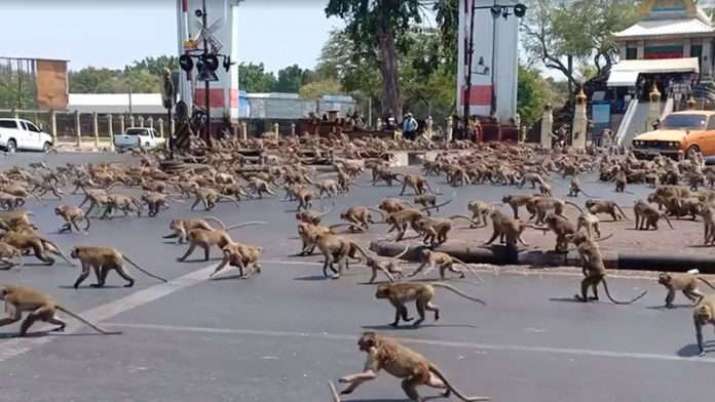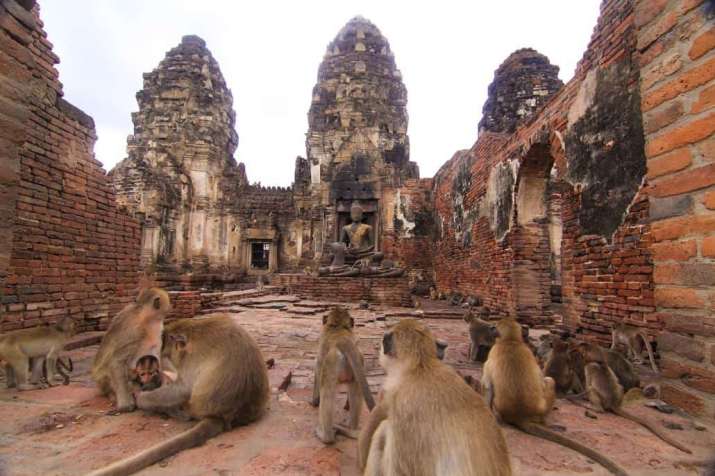
Far-reaching disruptions caused by the growing international novel coronavirus outbreak are now being felt among animal communities as well as human populations. The streets of the central Thai city of Lopburi, famed for its ancient Buddhist temples and thousands of semi-tame monkeys, were the scene of a running melee between rival gangs of macaques on Wednesday. Hundreds of hungry monkeys brawled over food after the gloabl spread of COVID-19 has seen tourist numbers plummet, consequently cutting off a major source of food for Lopburi’s usually well-fed simian population.
Video footage of the incident showed hundreds of monkeys swarming across a public square, in front the city’s bemused human inhabitants, in aggressive pursuit of a single primate clutching a banana.
“It’s the summer so usually we see a lot of tourists, but now because of the [novel coronavirus] outbreak there’s so few that the markets are very quiet. Not enough tourists come to leave food for the monkeys at Prang Sam Yod [temple],” said local resident Sasaluk Rattanachai, who posted a video of the brawl on social media. (Khaosod English)
According to the Bangkok Post newspaper, the thousands of monkeys that inhabit Lopburi usually affiliate themselves with one of two macaque communities or “gangs”: the temple monkeys or the city monkeys.
Biew Um-in, a motorcycle taxi driver, told local media that he had seen the chief of the temple monkeys lead a team into an area occupied rival city macaques to find food at a market. The head of the city monkeys then fought back, he said, chasing the intruders out of their territory.
“I haven’t seen a fight like this for many years that I can remember. Normally, the fights involve 5–10 monkeys,” he said. (Khaosod English)
Traffic was held up for about 10 minutes as the rival gangs charged at each other.
“They looked more like wild dogs than monkeys. They went crazy for a single piece of food. I’ve never seen them this aggressive,” said shopkeeper Sasaluk Rattanachai. “I think the monkeys were very, very hungry. There’s normally a lot of tourists here to feed the monkeys but now there are not as many, because of the coronavirus.”
At the time of writing, global coronavirus infections were reported to total 135,194, with 4,971 deaths so far confirmed. The majority of coronavirus infections and fatalities have occurred in mainland China, which has reported a death toll of 3,176 people and a total of 80,813 infections, according to official data from the Chinese health authorities. Official figures in Thailand show 75 infections, with one fatality linked to the outbreak. COVID-19 is believed to have first spread from an illegal wildlife market in the Chinese city of Wuhan, in central Hubei Province. The World Health Organization has estimated the mortality rate from the virus at 2–5 per cent, with the elderly and people with underlying health conditions considered most at risk.

In addition to numerous sites of Buddhist interest, such as ancient temples, the city of Lopburi is famed for it population of thousands of gregarious macaques, who are not shy to beg or even steal from tourists and locals. In recent years, their numbers have ballooned to unmanageable levels, and the monkeys, emboldened by years of human contact, have become a frequent nuisance to tourists and local residents alike.
The temple monkeys control areas around the Phra Prang Sam Yod complex, a triple-spired Khmer temple, while the city monkeys live around the historic Phra Kan Shrine, a Brahman shrine complex that also dates back to the Khmer era.
“This area is the kingdom of the city monkeys,” said Pattakorn Witchaplakorn, 52, a railway officer who also looks after the water trough for the town monkeys. (Khaosod English)
On Thursday morning, monkeys were seen foraging through trash for scraps of food, but later in the day local residents had laid out additional food offerings for them to eat at both temple sites.
Thailand is a predominantly Theravada Buddhist country, with 94.5 per cent of the nation’s population of 69 million identifying as Buddhists, according to government census data for 2015. The Southeast Asian kingdom has some 40,000 Buddhist temples and almost 300,000 monks. While communities of female renunciants also exist, the monastic authorities in Thailand have never officially recognized the ordination of women, and bhikkhunis do not generally enjoy the same level of societal acceptance as their male counterparts.
See more
Monkey brawl in Lop Buri shocks humans (Bangkok Post)
Lopburi’s Monkeys Food War Blamed on Plunge in Tourism (Khaosod English)
Hundreds of monkeys clash in middle of city in Thailand (Stuff)
Monkey Wars: Macaque melee overruns downtown Lopburi (Video) (Coconuts Bangkok)












